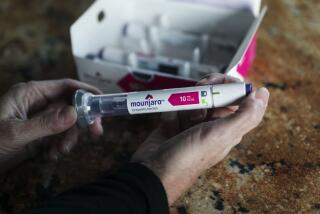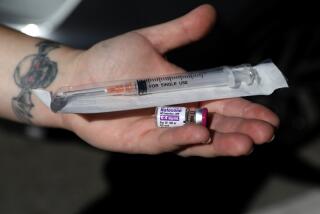FDA approves Belsomra, a new prescription sleep drug
The Food & Drug Administration on Wednesday approved U.S. marketing of the first in a new class of sleep drugs that targets the brain’s wakefulness centers to speed the onset of sleep and reduce nighttime awakening. The new medication, which goes by the generic name suvorexant, is to be marketed by its manufacturer, Merck, Sharpe & Dohme Corp., as Belsomra.
In approving Belsomra in four different strengths, the FDA bowed to concerns raised by an independent panel of advisors that, at high doses, the new drug can cause drowsiness and impaired driving that persists into the next day. Patients should take no more than the maximum dose approved, 20 milligrams, of Belsomra, with a minimum of seven hours to sleep. And those patients should be cautioned against next-day driving or activities requiring full alertness, the FDA has cautioned.
The drug’s manufacturer had initially proposed marketing doses of suvorexant as high as 40 milligrams. In addition to the maximum dose of 20 milligrams, the FDA has approved 5-milligram, 10-milligram and 15-milligram doses of the medication, and recommended that those with insomnia use the lowest possible dose of the medication to avoid drowsiness lasting into the next day. The agency also has required the manufacturer to conduct a study of next-day driving performance in those taking Belsomra.
An estimated 10% to 30% of Americans are thought to suffer from insomnia. Most patients who seek medication to go to sleep faster or to stay asleep are prescribed a class of drugs called hypnotics, including medications in the benzodiazepine family (sold under such commercial names as Xanax, Ativan, Restoril and Halcion) and non-diazepine hypnotics sold under such commercial names as Zaleplon, Ambien, Lunesta and Ramelteon.
Belsomra acts as an inhibitor of the brain’s orexin neurons in its arousal circuits. In clinical trials submitted to the FDA, after three months’ use, it caused subjects to fall asleep between 17 and 23 minutes more quickly than did subjects taking a placebo. And compared to subjects taking the placebo, those taking the medication’s proposed low dose for three months stayed asleep for 11 to 23 minutes longer per night.
The manufacturer said Wednesday that it expects the new prescription drug to be in pharmacies in late 2014 or early 2015.
My coverage of health won’t speed sleep onset, but it will keep you informed. Follow me on Twitter @LATmelissahealy.







